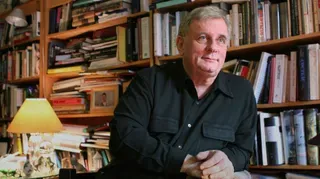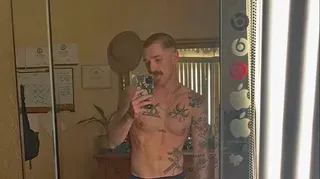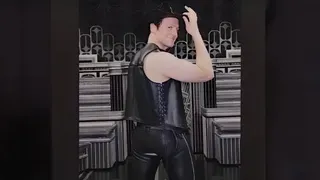May 29, 2013
Growing Up Is Hard To Do - Greta Gerwig on 'Frances Ha'
Robert Nesti READ TIME: 10 MIN.
In the acclaimed new comedy/drama 'Frances Ha,' Greta Gerwig plays a 20-something in flux. Her roommate has moved, her career choice is a dead-end & she's living in the not-so-distant past. EDGE spoke with the actress, who has received great reviews, about her latest.
When Greta Gerwig started acting in films, she was the Parker Posey of the 'mumblecore' movement, those independent movies known for their low production values and narratives that dealt with the angst of twenty-somethings. "It didn't even feel like low stakes-it felt like no stakes," Gerwig told Interview Magazine two years ago. "You make messy art when you're young. I didn't think anyone would see those films."
One person that did watch one of those films, specifically Joe Swanberg's 2007 "Hannah Takes the Stairs," was Noah Baumbach, the indie director of such acclaimed titles as "The Squid and the Whale" (for which he received an Oscar nomination for Best Screenplay) and "Margot at the Wedding." In fact, he considered "Hannah..." the best film released that year and he sought Gerwig out for a co-starring role in his 2010 film "Greenberg." In that comedy/drama, she played the 25-year old love interest to Ben Stiller, a 40-something New Yorker who has relocated to Los Angeles for no other reason than he can housesit for his more successful brother. Gerwig played his brother's personal assistant, who, like Stiller, is drifting through life.
That same description can apply to Frances, the 27-year-old New Yorker that Gerwig plays in Baumbach's current film "Frances Ha" (in limited release). An apprentice dancer with an up-and-coming company, Frances lives a post-collegiate life with her roommate Sophie. As the film starts, the two recite a mantra of how they're going to change the world, Sophie as an editor and Frances as a dancer. But when Sophie moves out to live with a less-messy roommate and Frances is cut from the dance company, it's time for a reality check.
It makes for both a painful and funny journey, largely because Gerwig is so emotionally connected to her character. It's not surprising that she co-wrote the feature (with Baumbach) and brings much of herself to her role, though, in reality, her career is far more directed than the complacent and aimless Hannah, whose reality conflicts with her bohemian friends with trust funds. She's not unlike a character from Whit Stillman's films; in fact, last year she starred in that elusive director's most recent films, "Damsels in Distress," playing a character not all that removed from Frances.
The blonde Gerwig, who brings to mind such actresses such as Chlo� Sevigny and Zooey Deschanel, also had a featured role in Woody Allen's most recent film, "To Rome With Love," which was a dream-come-true for the 28-year old that has idolized Allen her entire life.
EDGE spoke to Gerwig recently about how the film came about, how much of herself is in the character of Frances and why the film was shot in black-and-white.
No improv
EDGE: How did the film come about?
Greta Gerwig: After 'Greenberg' was released, Noah contacted me and asked me if I was interested in collaborating on a script with him with a role in it for me to play. We started exchanging ideas - little moments and character ideas. And we're very similar in the way we write, and just started writing scenes.
EDGE: Have you written for film before this?
Greta Gerwig: I have co-written and co-directed some small films, but they didn't feel like this. There was a lot of improvisation in them. There is no improvisation in this film. It's word-for-word as it was in the script. In the other movies, I would have people improv around a situation. This was the first time I saw that the actual language mattered since I wrote plays in college and after college. It was a tremendous learning experience for me. I felt like I grew a lot in the process of working on it.
Painful transition
EDGE: The film is about the transition that Frances makes when her post-college life begins to come apart, which is painful and funny. Why did Noah and you focus on this particular moment?
Greta Gerwig: Well, it is something - that moment - that we were particularly interested in. Part of it was being tied to the age that I was. I was very interested in that moment around 27 or 28 when you seem to lose your youth without noticing it. Frances has been out of college for five or six years and shouldn't be going through the stuff she's going through. She's holding onto a more juvenile version of her life and needs to let go of it. But between her ambitions with dancing and her relationship with Sophie, she has a lot of trouble giving up the dreams she had at 21. When you're around 27, for me, it's the moment you realize this is your one life. You are living it right now. There are no do-overs. You have to figure this out for yourself. It's like, you're not so young anymore. Maybe you should take that clerical job...
EDGE: Frances sees her friends as family - is that a mistake?
Greta Gerwig: Well, I understand that very much.. the feeling that you're going to live in a house together and be friends for the rest of their lives. But the reality is that they're going to fall in love and want to start their own family, and it won't be with you. The truth is that your friends aren't your family. They may feel like your family after college, but they're not.
An awkward scene
EDGE: At one point Frances describes her relationship with Sophie as a 'lesbian relationship without the sex.' Have you had relationships like that?
Greta Gerwig: I went to an all women's college and I have these female friends that I really love. But our friendships have transitioned from the time we had 24/7 contact - and sleeping in beds together and talking on the telephone and knowing every detail about each other's lives. Now these friendships are different. We don't live life together the same way.
EDGE: There's a scene about midway through when Frances goes to a dinner party and is clearly out-of-her-league. She kind-of makes a fool of herself, but is oblivious. Was that difficult to act?
Greta Gerwig: It was harder to write than acting it. It's very awkward and sad on the page, but it is very funny when it plays out. On the page, it was so bleak because there were no actors embodying any of it. But for me the process of performing it and watching it with an audience made me feel better about that scene. I had shown the script to my friend Sara and she said that scene was devastating and she could almost not read it. Frances, she felt, was so arrogant and disconnected from how she's coming off. And it was painful for her to read. I felt the same way. But acting it out took it to another place.
The ’Girls’ thing
EDGE: What do you think of reviews that compare the film to Lena Dunham's HBO series 'Girls?' I mean, Frances could easily become a regular on that series.
Greta Gerwig: Well, if you hate 'Girls,' it's a bad comparison. But if you like 'Girls,' then it's awesome. Lena's a good friend of mine. She hasn't seen the film yet, but she's excited about seeing it. I hope she likes it.
EDGE: Why did you make Frances a dancer? You can see the passion, but wonder why she's pursuing it.
Greta Gerwig: I always wanted to make a film about a dancer. I love watching dance on film. I don't think there's enough of it. And I think it is an amazing metaphor for what Frances is going through in a professional sense, which is that you have a real limits as a dancer. In other words, if she hasn't made it by 27, she probably isn't going to make it. It seems to mirror with what is going on with her relationship with Sophie.
EDGE: The film was shot in black-and-white. It has quite a beautiful look, but why?
Greta Gerwig: Noah and I talked about it being black-and-white very early in the process. We tested different cameras and finishing processes to make it the kind-of beautiful black-and-white that has real warmth. That's what we were going for, but it was our joint vision.
Working with Woody
EDGE: You worked with Woody Allen on 'To Rome With Love.' Is he an influence on you?
Greta Gerwig: Totally. It's so far-reaching for me that it's difficult to know where it begins and where it ends. I don't know I would want to make movies if it wasn't for him. That's about as big an influence as can be. So working with him was terrifying because I idolize him, But he's amazing. He's a great artist, and he's so funny and such a hard worker. He doesn't wait for inspiration, he makes inspiration happen. And the fact that he makes a movie every year, is pretty incredible and inspirational for me who wants to continue to make movies the rest of my life.
EDGE: Have you thought of doing any stage acting?
Greta Gerwig: I haven't acted on stage since college. I wrote a lot of plays then. I'd like to write a play now. But I really don't want to act on stage right now - I'm so in love with movies right now. And I feel you have to do what's in your heart, and right now it's movies.
EDGE: You have said that the film is about those moments in your life when something comes to an end, but you don't know it. Could you explain?
Greta Gerwig: Well, we didn't intellectualize it, but it something that I am interested in the last time things happen. I think there's something sad and fascinating about those moments. It's not that I set out to write about a time ending moment, it's just that it is what I am drawn to such moments as a person and what they mean, and I can't help but write about the things I am drawn to.
Life and art
EDGE: How much of yourself did you bring to Frances? You grew up in Sacramento and Frances goes there. You even use your own parents to play Frances' parents.
Greta Gerwig: I took some material from my life and Noah took stuff from his life. I also put stuff about myself in other characters that you never get asked about because people assume it's not you, but there are things about some of the other characters that are very personal as well.
In some ways having her go to Sacramento felt safe because it is such a constructed movie - it is so written - that I wanted to put something that I was familiar with in the movie. I love Sacramento. I love the way it looks. And filming that section was like making a documentary. I almost felt like it was like a Cubist painter during the 1920s that would take a found object and put it in a piece of work that was artificial and make it more real.
But my experience was very different from Frances'. By the time I was 25 I had made a lot of movies, I was an actress with a SAG card. I had a career-of-sorts. The feeling of struggling was not the experience I had in my 20s.
"Frances Ha" is in limited release.
Robert Nesti can be reached at [email protected].







